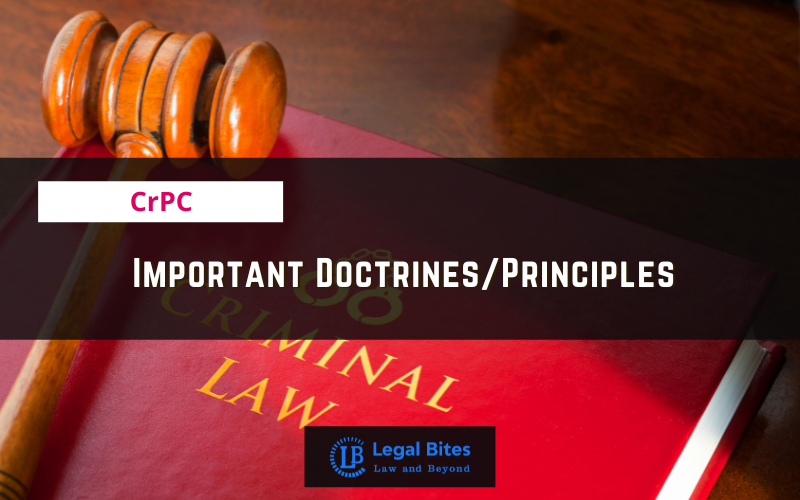Important Doctrines/Principles under CrPC
Read important Doctrines/Principles under CrPC only on Legal Bites.

This article titled ‘Important Doctrines/Principles under CrPC’ deals with various important doctrines and principles used in the Criminal Procedural Code along with brief descriptions. Important Doctrines/Principles under CrPC 1. Principle of Autrefois Acquit Autrefois Convict [Section 300] Autrefois acquit is a way of the rule it means previously acquitted. Similarly, Autrefois convict means previously convicted. The former means that no person should be prosecuted twice for...
This article titled ‘Important Doctrines/Principles under CrPC’ deals with various important doctrines and principles used in the Criminal Procedural Code along with brief descriptions.
Important Doctrines/Principles under CrPC
1. Principle of Autrefois Acquit Autrefois Convict [Section 300]
Autrefois acquit is a way of the rule it means previously acquitted. Similarly, Autrefois convict means previously convicted. The former means that no person should be prosecuted twice for the offence he was previously acquitted for.
2. Principle of Fair Trial
This principle has elements all over the Code. For instance, principle of speedy trial [section 309]; free legal aid [section 304] etc.
3. Principle of Impartiality of Judges
Section 479 provides that no Judge or Magistrate shall, except with the permission of the Court to which an appeal lies from his Court, try or commit for trial any case to or in which he is a party, or personally interested, and no Judge or Magistrate shall hear an appeal from any judgement or order passed or made by himself.
4. Bail as a rule, jail as exception
‘Bail is a rule, jail is an exception’ is a legal doctrine that was laid down by the Supreme Court of India in a landmark judgment of State of Rajasthan vs. Balchand alias Baliya (AIR 1977 2447), as forming as a guiding principle for grant of bail in case of non-bialable offences.
5. Legal aid
Right to free legal aid is one of the fundamental right that has been provided to every citizen of our country and has been enshrined in Art 22(1) of the Constitution of India. Criminal procedure code of 1973 has also incorporated this ideology in section 304 of the act.
6. Plea Bargaining
Plea bargaining is a pre-trial negotiation between the accused and the prosecution where the accused agrees to plead guilty in exchange for certain concessions by the prosecution. It is a bargain wherein a defendant pleads responsible to a lesser fee and the prosecutors in go backdrop more serious charge.
7. Principle of Further Investigation
The concept of ‘Further Investigation’ and supplementary report is dealt with under Section 173 (8) Criminal Procedure Code, 1973 The earlier Code of Criminal Procedure, 1898 did not contain the provision regarding the concept of ‘Further Investigation’ within its ambit.
8. Speedy Trial
Section 309 (1) Criminal Procedure Code provides “in every inquiry of trial, the proceedings shall be held as expeditiously as possible, and in particular, when the examination of witnesses has once begun, the same shall be continued from day to day until all the witnesses in attendance have been examined, unless the court finds the adjournment of the same beyond the following day to be necessary for reasons to be recorded”.
9. Audi Alteram Partem
The code, therefore, provides in Section 228, 239, and 251 in plain words that when an accused person is brought before the court for trial, the particulars of the offence of which he is accused shall be stated to him. So that accused can prepare his defence for facing the trial. Section 313 of Criminal Procedure Code also provides that incriminating circumstances that the are appearing against the accused should be explained to the accused.

Paras Ahuja
Paras Ahuja is a law graduate from National Law University, Jodhpur (2022). She has graduated with Constitutional Law Honours and takes a specific interest in gender laws and labour laws.
